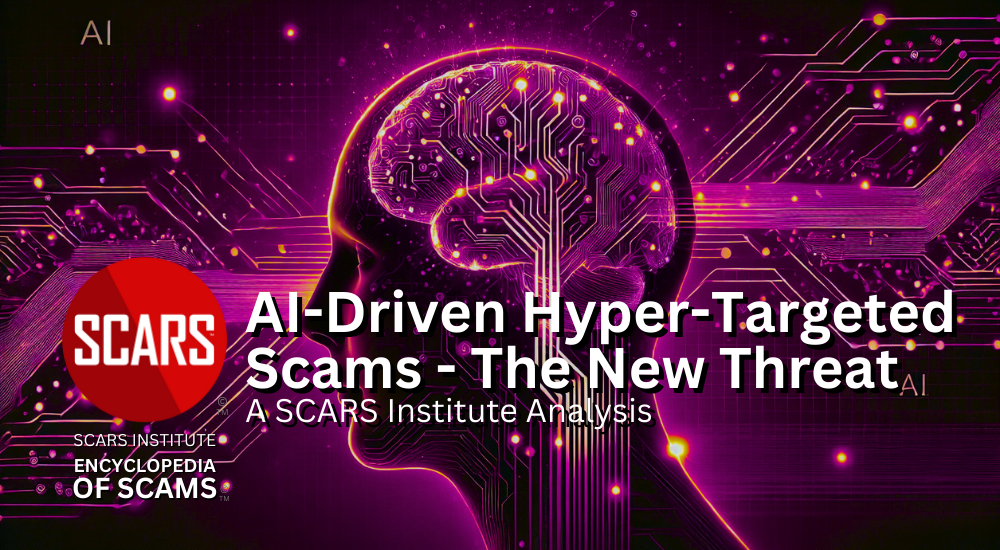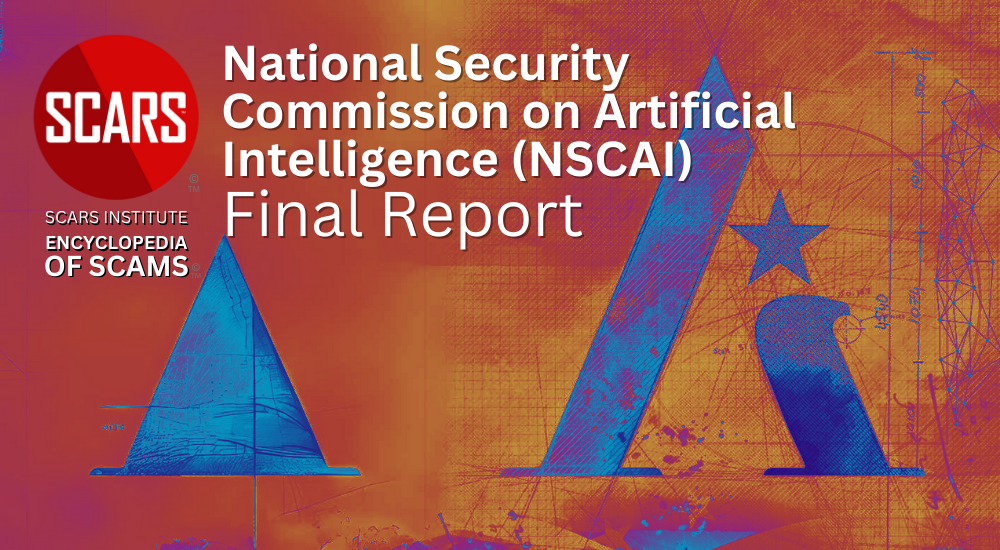
SCARS Institute’s Encyclopedia of Scams™ Published Continuously for 25 Years

Are We Doomed? AI (Artificial Intelligence) and the United States
National Security Commission On Artificial Intelligence (AI) Final Report – Letter from the Chair and Vice Chair
Scams and AI – A SCARS Institute Special Report
Authors:
• SCARS Institute Encyclopedia of Scams Editorial Team – Society of Citizens Against Relationship Scams Inc.
• Portions by the U.S. National Security Commission On Artificial Intelligence
Article Abstract
The National Security Commission on Artificial Intelligence (NSCAI) warns that the United States is unprepared to compete and defend itself in the AI era, emphasizing the urgent need for comprehensive national action. AI offers immense potential to benefit humanity, but it also poses significant threats as adversaries use AI for disinformation, cyberattacks, and smart weapons.
The report highlights the need for AI readiness in national security, urging collaboration between government, industry, and allies to protect U.S. interests. Additionally, the Commission stresses the importance of investing in AI talent, hardware, and innovation, as well as establishing leadership structures to navigate the strategic, economic, and security challenges AI presents. The stakes are high, particularly as AI competition with China intensifies. The U.S. must act decisively to ensure technological leadership and safeguard democracy in an era where AI is reshaping global power dynamics.

National Security Commission On Artificial Intelligence Final Report – Letter from the Chair and Vice Chair
CLICK ON THE PDF FOR THE FULL REPORT
Americans have not yet grappled with just how profoundly the artificial intelligence (AI) revolution will impact our economy, national security, and welfare. Much remains to be learned about the power and limits of AI technologies. Nevertheless, big decisions need to be made now to accelerate AI innovation to benefit the United States and to defend against the malign uses of AI.
When considering these decisions, our leaders confront the classic dilemma of statecraft identified by Henry Kissinger: “When your scope for action is greatest, the knowledge on which you can base this action is always at a minimum. When your knowledge is greatest, the scope for action has often disappeared.” The scope for action remains, but America’s room for maneuver is shrinking.
As a bipartisan commission of 15 technologists, national security professionals, business executives, and academic leaders, the National Security Commission on Artificial Intelligence (NSCAI) is delivering an uncomfortable message: America is not prepared to defend or compete in the AI era. This is the tough reality we must face. And it is this reality that demands comprehensive, whole-of-nation action. Our final report presents a strategy to defend against AI threats, responsibly employ AI for national security, and win the broader technology competition for the sake of our prosperity, security, and welfare. The U.S. government cannot do this alone. It needs committed partners in industry, academia, and civil society. And America needs to enlist its oldest allies and new partners to build a safer and freer world for the AI era.
AI is an inspiring technology. It will be the most powerful tool in generations for benefiting humanity. Scientists have already made astonishing progress in fields ranging from biology and medicine to astrophysics by leveraging AI. These advances are not science fair experiments; they are improving life and unlocking mysteries of the natural world. They are the kind of discoveries for which the label “game changing” is not a cliché.
AI systems will also be used in the pursuit of power. We fear AI tools will be weapons of first resort in future conflicts. AI will not stay in the domain of superpowers or the realm of science fiction. AI is dual-use, often open-source, and diffusing rapidly. State adversaries are already using AI-enabled disinformation attacks to sow division in democracies and jar our sense of reality. States, criminals, and terrorists will conduct AI-powered cyber attacks and pair AI software with commercially available drones to create “smart weapons.” It is no secret that America’s military rivals are integrating AI concepts and platforms to challenge the United States’ decades-long technology advantage. We will not be able to defend against AI-enabled threats without ubiquitous AI capabilities and new warfighting paradigms. We want the men and women in national security departments and agencies to have access to the best technology in the world to defend themselves and us, and to protect our interests and those of our allies and partners.
Despite exciting experimentation and a few small AI programs, the U.S. government is a long way from being “AI-ready.” The Commission’s business leaders are most frustrated by slow government progress because they know it’s possible for large institutions to adopt AI. AI integration is hard in any sector—and the national security arena poses some unique challenges. Nevertheless, committed leaders can drive change. We need those leaders in the Pentagon and across the Federal Government to build the technical infrastructure and connect ideas and experimentation to new concepts and operations. By 2025, the Department of Defense and the Intelligence Community must be AI-ready.
We should embrace the AI competition. Competition already infuses the quests for data, computing power, and the holy grail: the rare talent to make AI breakthroughs. The fact that AI courses through so many adjacent technologies and is leveraged across so many fields explains its power and leads inexorably to another critical point: AI is part of a broader global technology competition. Competition will speed up innovation. We should race together with partners when AI competition is directed at the moonshots that benefit humanity like discovering vaccines. But we must win the AI competition that is intensifying strategic competition with China. China’s plans, resources, and progress should concern all Americans. It is an AI peer in many areas and an AI leader in some applications. We take seriously China’s ambition to surpass the United States as the world’s AI leader within a decade.
The AI competition is also a values competition. China’s domestic use of AI is a chilling precedent for anyone around the world who cherishes individual liberty. Its employment of AI as a tool of repression and surveillance—at home and, increasingly, abroad—is a powerful counterpoint to how we believe AI should be used. The AI future can be democratic, but we have learned enough about the power of technology to strengthen authoritarianism abroad and fuel extremism at home to know that we must not take for granted that future technology trends will reinforce rather than erode democracy. We must work with fellow democracies and the private sector to build privacy-protecting standards into AI technologies and advance democratic norms to guide AI uses so that democracies can responsibly use AI tools for national security purposes.
We would like to emphasize a few areas where action is necessary because the stakes of the competition are so high:
Leadership
Ultimately, we have a duty to convince the leaders in the U.S. government to make the hard decision and make the down payment to win the AI era. In America, the buck stops with the President, and AI strategy starts in the White House. We built a National Security Council to confront the challenges of the post–World War II era. Now we need to create a Technology Competitiveness Council to build a strategy that accounts for the complex security, economic, and scientific challenges of AI and its associated technologies. That leadership imperative extends into all critical national security departments and agencies.
Talent
The human deficit is the government’s most conspicuous AI deficit and the single greatest inhibitor to buying, building, and fielding AI-enabled technologies for national security purposes. This is not a time to add a few new positions in national security departments and agencies for Silicon Valley technologists and call it a day. We need to build entirely new talent pipelines from scratch. We should establish a new Digital Service Academy and civilian National Reserve to grow tech talent with the same seriousness of purpose that we grow military officers. The digital age demands a digital corps. Just as importantly, the United States needs to win the international talent competition by improving STEM education and our highly skilled immigration system.
Hardware
Microelectronics power all AI, and the United States no longer manufactures the world’s most sophisticated chips. We do not want to overstate the precariousness of our position, but given that the vast majority of cutting-edge chips are produced at a single plant separated by just 110 miles of water from our principal strategic competitor, we must reevaluate the meaning of supply chain resilience and security. A recent chip shortage for auto manufacturing cost an American car company an estimated $2.5 billion. A strategic blockage would cost far more and put our security at risk. The federal investment and incentives needed to revitalize domestic microchip fabrication—perhaps $35 billion—should be an easy decision when the alternative is relying on another country to produce the engines that power the machines that will shape the future.
Innovation Investment
We worry that only a few big companies and powerful states will have the resources to make the biggest AI breakthroughs. Despite the diffusion of open-source tools, the needs for computing power and troves of data to improve algorithms are soaring at the cutting edge of innovation. The federal government must partner with U.S. companies to ensure America leads the world and to support development of diverse AI applications that advance the national interest in the broadest sense. If anything, this report underplays the investments America will need to make. The $40 billion we recommend to expand and democratize federal AI R&D is a modest down payment on future breakthroughs. We will also need to build secure digital infrastructure across the nation, shared cloud computing access, and smart cities to truly leverage AI for the benefit of all Americans. We envision hundreds of billions in federal spending in the coming years.
This is not a time for abstract criticism of industrial policy or fears of deficit spending to stand in the way of progress. In 1956, President Dwight Eisenhower, a fiscally conservative Republican, worked with a Democratic Congress to commit $10 billion to build the Interstate Highway System. That is $96 billion in today’s world. Surely we can make a similar investment in the nation’s future.
We are proud of the NSCAI’s bipartisan work. We have debated together, learned together, and achieved consensus on critical points. It is our privilege to submit our recommendations to Congress and the President. To paraphrase Winston Churchill, we are at the beginning of the beginning of the competition that will shape our prosperity, national security, and the well-being of our citizens. Our report presents the first steps the United States should take to defend, compete, and win in the AI era.
SCARS Institute Analysis
The increasing integration of artificial intelligence (AI) into the fabric of society poses significant challenges for the fight against cybercrime, scams, and fraud.
As AI evolves, it enhances both the capabilities of law enforcement and those of criminals. AI-enhanced crimes—such as sophisticated phishing attacks, AI-generated deepfakes, and personalized fraud—could lead to unprecedented financial losses. Cybercriminals can leverage AI to create hyper-targeted scams, exploit vulnerabilities in digital systems, and automate attacks on a massive scale. This makes traditional defenses against cybercrime less effective, as AI tools allow criminals to adapt and innovate at a pace previously unseen.
The potential financial losses from AI-facilitated crimes are staggering. With AI’s ability to scale, manipulate, and refine fraudulent schemes, both individuals and businesses face greater risks. For victims, especially in fraud and scams, AI can make detection nearly impossible, leading to financial ruin before they even realize they’ve been targeted. Governments, corporations, and individuals must rethink their cybersecurity frameworks and invest heavily in AI-driven defense mechanisms to counter these new threats.
AI-driven crime will exploit the very same attributes that make AI transformative, creating a high-stakes battle between technological innovation and criminal activity. Without robust and rapid responses, the financial, emotional, and psychological tolls on victims of AI-enhanced crimes could reach levels never before experienced.
-/ 30 /-
What do you think about this?
Please share your thoughts in a comment below!
Table of Contents
- National Security Commission On Artificial Intelligence (AI) Final Report – Letter from the Chair and Vice Chair
- Article Abstract
- National Security Commission On Artificial Intelligence Final Report – Letter from the Chair and Vice Chair
- Leadership
- Talent
- Hardware
- Innovation Investment
- SCARS Institute Analysis
LEAVE A COMMENT?
Recent Comments
On Other Articles
- Arwyn Lautenschlager on Love Bombing And How Romance Scam Victims Are Forced To Feel: “I was love bombed to the point that I would do just about anything for the scammer(s). I was told…” Feb 11, 14:24
- on Dani Daniels (Kira Lee Orsag): Another Scammer’s Favorite: “You provide a valuable service! I wish more people knew about it!” Feb 10, 15:05
- on Danielle Delaunay/Danielle Genevieve – Stolen Identity/Stolen Photos – Impersonation Victim UPDATED 2024: “We highly recommend that you simply turn away form the scam and scammers, and focus on the development of a…” Feb 4, 19:47
- on The Art Of Deception: The Fundamental Principals Of Successful Deceptions – 2024: “I experienced many of the deceptive tactics that romance scammers use. I was told various stories of hardship and why…” Feb 4, 15:27
- on Danielle Delaunay/Danielle Genevieve – Stolen Identity/Stolen Photos – Impersonation Victim UPDATED 2024: “Yes, I’m in that exact situation also. “Danielle” has seriously scammed me for 3 years now. “She” (he) doesn’t know…” Feb 4, 14:58
- on An Essay on Justice and Money Recovery – 2026: “you are so right I accidentally clicked on online justice I signed an agreement for 12k upfront but cd only…” Feb 3, 08:16
- on The SCARS Institute Top 50 Celebrity Impersonation Scams – 2025: “Quora has had visits from scammers pretending to be Keanu Reeves and Paul McCartney in 2025 and 2026.” Jan 27, 17:45
- on Scam Victims Should Limit Their Exposure To Scam News & Scammer Photos: “I used to look at scammers photos all the time; however, I don’t feel the need to do it anymore.…” Jan 26, 23:19
- on After A Scam, No One Can Tell You How You Will React: “This article was very informative, my scams happened 5 years ago; however, l do remember several of those emotions and/or…” Jan 23, 17:17
- on Situational Awareness and How Trauma Makes Scam Victims Less Safe – 2024: “I need to be more observant and I am practicing situational awareness. I’m saving this article to remind me of…” Jan 21, 22:55
ARTICLE META
Important Information for New Scam Victims
- Please visit www.ScamVictimsSupport.org – a SCARS Website for New Scam Victims & Sextortion Victims
- Enroll in FREE SCARS Scam Survivor’s School now at www.SCARSeducation.org
- Please visit www.ScamPsychology.org – to more fully understand the psychological concepts involved in scams and scam victim recovery
If you are looking for local trauma counselors please visit counseling.AgainstScams.org or join SCARS for our counseling/therapy benefit: membership.AgainstScams.org
If you need to speak with someone now, you can dial 988 or find phone numbers for crisis hotlines all around the world here: www.opencounseling.com/suicide-hotlines
A Note About Labeling!
We often use the term ‘scam victim’ in our articles, but this is a convenience to help those searching for information in search engines like Google. It is just a convenience and has no deeper meaning. If you have come through such an experience, YOU are a Survivor! It was not your fault. You are not alone! Axios!
A Question of Trust
At the SCARS Institute, we invite you to do your own research on the topics we speak about and publish, Our team investigates the subject being discussed, especially when it comes to understanding the scam victims-survivors experience. You can do Google searches but in many cases, you will have to wade through scientific papers and studies. However, remember that biases and perspectives matter and influence the outcome. Regardless, we encourage you to explore these topics as thoroughly as you can for your own awareness.
Statement About Victim Blaming
SCARS Institute articles examine different aspects of the scam victim experience, as well as those who may have been secondary victims. This work focuses on understanding victimization through the science of victimology, including common psychological and behavioral responses. The purpose is to help victims and survivors understand why these crimes occurred, reduce shame and self-blame, strengthen recovery programs and victim opportunities, and lower the risk of future victimization.
At times, these discussions may sound uncomfortable, overwhelming, or may be mistaken for blame. They are not. Scam victims are never blamed. Our goal is to explain the mechanisms of deception and the human responses that scammers exploit, and the processes that occur after the scam ends, so victims can better understand what happened to them and why it felt convincing at the time, and what the path looks like going forward.
Articles that address the psychology, neurology, physiology, and other characteristics of scams and the victim experience recognize that all people share cognitive and emotional traits that can be manipulated under the right conditions. These characteristics are not flaws. They are normal human functions that criminals deliberately exploit. Victims typically have little awareness of these mechanisms while a scam is unfolding and a very limited ability to control them. Awareness often comes only after the harm has occurred.
By explaining these processes, these articles help victims make sense of their experiences, understand common post-scam reactions, and identify ways to protect themselves moving forward. This knowledge supports recovery by replacing confusion and self-blame with clarity, context, and self-compassion.
Additional educational material on these topics is available at ScamPsychology.org – ScamsNOW.com and other SCARS Institute websites.
Psychology Disclaimer:
All articles about psychology and the human brain on this website are for information & education only
The information provided in this article is intended for educational and self-help purposes only and should not be construed as a substitute for professional therapy or counseling.
While any self-help techniques outlined herein may be beneficial for scam victims seeking to recover from their experience and move towards recovery, it is important to consult with a qualified mental health professional before initiating any course of action. Each individual’s experience and needs are unique, and what works for one person may not be suitable for another.
Additionally, any approach may not be appropriate for individuals with certain pre-existing mental health conditions or trauma histories. It is advisable to seek guidance from a licensed therapist or counselor who can provide personalized support, guidance, and treatment tailored to your specific needs.
If you are experiencing significant distress or emotional difficulties related to a scam or other traumatic event, please consult your doctor or mental health provider for appropriate care and support.
Also read our SCARS Institute Statement about Professional Care for Scam Victims – click here to go to our ScamsNOW.com website.
















Thank you for your comment. You may receive an email to follow up. We never share your data with marketers.